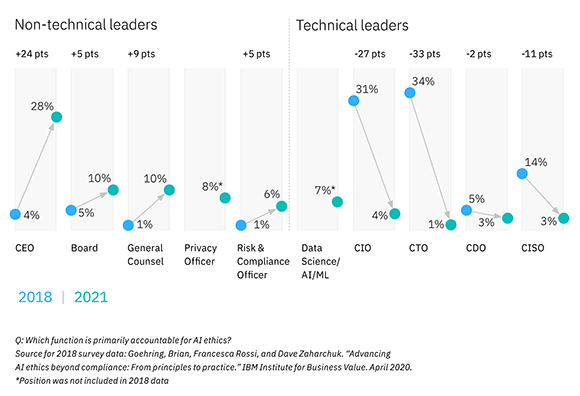80% of respondents in this year's survey pointed to a non-technical executive as the primary advocates for AI ethics, compared to 15% in 2018
79% of CEOs surveyed are prepared to implement AI ethics practices but less than a quarter of organizations have acted on it
68% of organizations acknowledge diversity is important to mitigating bias in AI, but respondents indicated their AI teams are: 5.5 times less inclusive of women, 4 times less inclusive of LGBT+ individuals and 1.7 times less racially inclusive
A new IBM Institute for Business Value (IBV) study revealed a radical shift in the roles responsible for leading and upholding AI ethics at an organization. When asked which function is primarily accountable for AI ethics, 80% of respondents pointed to a non-technical executive, such as a CEO, as the primary "champion" for AI ethics, a sharp uptick from 15% in 2018.
Experience the interactive Multichannel News Release here: https://www.multivu.com/players/English/9002052-ibm-study-ai-ethics-action-enterprise-guide-progressing-trustworthy/

Which function is primary responsible for AI ethics?
The global study* also indicates that despite a strong imperative for advancing trustworthy AI, including better performance compared to peers in sustainability, social responsibility, and diversity and inclusion, there remains a gap between leaders' intention and meaningful actions. The study found:
Business executives are now seen as the driving force in AI ethics
- CEOs (28%) – but also Board members (10%), General Counsels (10%), Privacy Officers (8%), and Risk & Compliance Officers (6%) are viewed as being most accountable for AI ethics by those surveyed.
- While 66% of respondents cite the CEO or other C-level executive as having a strong influence on their organization's ethics strategy, more than half cite board directives (58%) and the shareholder community (53%).
Building trustworthy AI is perceived as a strategic differentiator and organizations are beginning to implement AI ethics mechanisms.
- More than three-quarters of business leaders surveyed this year agree AI ethics is important to their organizations, up from about 50% in 2018.
- At the same time, 75% of respondents believe ethics is a source of competitive differentiation, and more than 67% of respondents that view AI and AI ethics as important indicate their organizations outperform their peers in sustainability, social responsibility, and diversity and inclusion.
- Many companies have started making strides. In fact, more than half of respondents say their organizations have taken steps to embed AI ethics into their existing approach to business ethics.
- More than 45% of respondents say their organizations have created AI-specific ethics mechanisms, such as an AI project risk assessment framework and auditing/review process.
Ensuring ethical principles are embedded in AI solutions is an urgent need for organizations, but progress is still too slow
- More surveyed CEOs (79%) are now prepared to embed AI ethics into their AI practices – up from 20% in 2018 -- and more than half of responding organizations have publicly endorsed common principles of AI ethics.
- Yet, less than a quarter of responding organizations have operationalized AI ethics, and fewer than 20% of respondents strongly agreed that their organization's practices and actions match (or exceed) their stated principles and values.
- 68% of surveyed organizations acknowledge that having a diverse and inclusive workplace is important to mitigating bias in AI, but findings indicate that AI teams are still substantially less diverse than their organizations' workforces: 5.5 times less inclusive of women, 4 times less inclusive of LGBT+ individuals and 1.7 times less racially inclusive.
"As many companies today use AI algorithms across their business, they potentially face increasing internal and external demands to design these algorithms to be fair, secured and trustworthy; yet, there has been little progress across the industry in embedding AI ethics into their practices," said Jesus Mantas, Global Managing Partner, IBM Consulting. "Our IBV study findings demonstrate that building trustworthy AI is a business imperative and a societal expectation, not just a compliance issue. As such, companies can implement a governance model and embed ethical principles across the full AI life cycle."
The time for companies to act is now. The study data suggests that those organizations who implement a broad AI ethics strategy interwoven throughout business units may have a competitive advantage moving forward. The study provides recommended actions for business leaders including:
- Take a cross-functional, collaborative approach - ethical AI requires a holistic approach, and a holistic set of skills across all stakeholders involved in the AI ethics process. C-Suite executives, designers, behavioral scientists, data scientists, and AI engineers each have a distinct role to play in the trustworthy AI journey.
- Establish both organizational and AI lifecycle governance to operationalize the discipline of AI ethics - take a holistic approach to incentivizing, managing and governing AI solutions across the full AI lifecycle, from establishing the right culture to nurture AI responsibly, to practices and policies to products.
- Reach beyond your organization for partnership – expand your approach by identifying and engaging key AI-focused technology partners, academics, startups, and other ecosystem partners to establish "ethical interoperability."
*Methodology
The IBV study, "AI ethics in action: An enterprise guide to progressing trustworthy AI," surveyed 1,200 executives in 22 countries across 22 industries to understand where executives stand on the importance of AI ethics and how organizations are operationalizing it. The study was conducted in cooperation with Oxford Economics in 2021. The full study is available at https://www.ibm.com/thought-leadership/institute-business-value/report/ai-ethics-in-action.
About IBM Institute for Business Value
For two decades, the IBM Institute for Business Value has served as the thought leadership think tank for IBM. What inspires us is producing research-backed, technology-informed strategic insights that help leaders make smarter business decisions.
From our unique position at the intersection of business, technology, and society, we survey, interview, and engage with thousands of executives, consumers, and experts each year, synthesizing their perspectives into credible, inspiring, and actionable insights.
To stay connected and informed, sign up to receive IBV's email newsletter at ibm.com/ibv. You can also follow @IBMIBV on Twitter or find us on LinkedIn at https://ibm.co/ibv-linkedin






















 More than ever, there is a demand for IT to deliver innovation. Your IBM i has been an essential part of your business operations for years. However, your organization may struggle to maintain the current system and implement new projects. The thousands of customers we've worked with and surveyed state that expectations regarding the digital footprint and vision of the company are not aligned with the current IT environment.
More than ever, there is a demand for IT to deliver innovation. Your IBM i has been an essential part of your business operations for years. However, your organization may struggle to maintain the current system and implement new projects. The thousands of customers we've worked with and surveyed state that expectations regarding the digital footprint and vision of the company are not aligned with the current IT environment. TRY the one package that solves all your document design and printing challenges on all your platforms. Produce bar code labels, electronic forms, ad hoc reports, and RFID tags – without programming! MarkMagic is the only document design and print solution that combines report writing, WYSIWYG label and forms design, and conditional printing in one integrated product. Make sure your data survives when catastrophe hits. Request your trial now! Request Now.
TRY the one package that solves all your document design and printing challenges on all your platforms. Produce bar code labels, electronic forms, ad hoc reports, and RFID tags – without programming! MarkMagic is the only document design and print solution that combines report writing, WYSIWYG label and forms design, and conditional printing in one integrated product. Make sure your data survives when catastrophe hits. Request your trial now! Request Now. Forms of ransomware has been around for over 30 years, and with more and more organizations suffering attacks each year, it continues to endure. What has made ransomware such a durable threat and what is the best way to combat it? In order to prevent ransomware, organizations must first understand how it works.
Forms of ransomware has been around for over 30 years, and with more and more organizations suffering attacks each year, it continues to endure. What has made ransomware such a durable threat and what is the best way to combat it? In order to prevent ransomware, organizations must first understand how it works. Disaster protection is vital to every business. Yet, it often consists of patched together procedures that are prone to error. From automatic backups to data encryption to media management, Robot automates the routine (yet often complex) tasks of iSeries backup and recovery, saving you time and money and making the process safer and more reliable. Automate your backups with the Robot Backup and Recovery Solution. Key features include:
Disaster protection is vital to every business. Yet, it often consists of patched together procedures that are prone to error. From automatic backups to data encryption to media management, Robot automates the routine (yet often complex) tasks of iSeries backup and recovery, saving you time and money and making the process safer and more reliable. Automate your backups with the Robot Backup and Recovery Solution. Key features include: Business users want new applications now. Market and regulatory pressures require faster application updates and delivery into production. Your IBM i developers may be approaching retirement, and you see no sure way to fill their positions with experienced developers. In addition, you may be caught between maintaining your existing applications and the uncertainty of moving to something new.
Business users want new applications now. Market and regulatory pressures require faster application updates and delivery into production. Your IBM i developers may be approaching retirement, and you see no sure way to fill their positions with experienced developers. In addition, you may be caught between maintaining your existing applications and the uncertainty of moving to something new. IT managers hoping to find new IBM i talent are discovering that the pool of experienced RPG programmers and operators or administrators with intimate knowledge of the operating system and the applications that run on it is small. This begs the question: How will you manage the platform that supports such a big part of your business? This guide offers strategies and software suggestions to help you plan IT staffing and resources and smooth the transition after your AS/400 talent retires. Read on to learn:
IT managers hoping to find new IBM i talent are discovering that the pool of experienced RPG programmers and operators or administrators with intimate knowledge of the operating system and the applications that run on it is small. This begs the question: How will you manage the platform that supports such a big part of your business? This guide offers strategies and software suggestions to help you plan IT staffing and resources and smooth the transition after your AS/400 talent retires. Read on to learn:
LATEST COMMENTS
MC Press Online